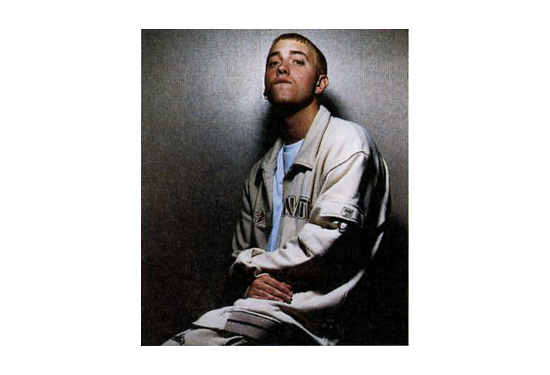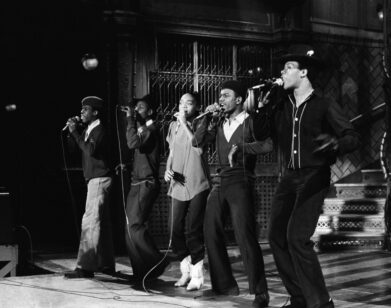New Again: Eminem

In New Again, we highlight a piece from Interview’s past that resonates with the present.
In this day and age, it’s deeply unusual for any pop-culture event to hold our collective attention for three days straight. Somehow, though, even though the now-infamous Miley Cyrus spectacle at this year’s VMAs happened on Sunday (that’s three weeks ago, in blog years!), the articles about it keep coming: Is Miley racist? Out of control? Embarrassing herself? Just enjoying some harmless youthful rebellion?
We’ve been thinking a lot about scandal since Sunday—but only in part because of Miley. See, Eminem seized on the VMA hype cycle, too: not with a foam finger but with an update to his website, featuring a photo of himself biting his lower lip and extending both middle fingers, along with minimal text: MMLP2 and NOV.5.2013. Yesterday, he released the album’s first single, the TKTK “Berzerk,” and two trailers are now available as well.
“Berzerk” begins promisingly: “Let’s take it back to straight hip-hop and start it from scratch,” Em implores, his voice sounding as barbed as ever. We’ve got high hopes that by titling the new album The Marshall Mathers LP 2, he’s hearkening back to the first MMLP, perhaps his best ever, which featured “The Real Slim Shady,” “Stan,” and “The Way I Am.” Way back in 2000, when that album was released, cultural critic Greil Marcus had some things to say about it. —Alexandria Symonds
Eminem—The Most Controversial Performer of Our Time
by Greil Marcus
A great pop moment took place last year on “Forgot About Dre,” the Dr. Dre/Eminem track on Dre’s 2001. The number starts off with a dramatic synth riff, immediately cut down by little clipped notes that sound like they’re from a Saturday morning cartoon soundtrack, but the repetition of those same notes bring the drama back. You sense someone nervously walking down the street, looking over his shoulder, looking straight ahead, left, right, needing more eyes in his head than he’s got.
Dre is defending himself from countless unnamed enemies who think his day has passed. It’s a hollow tale, but formally he’s brilliant. He’s moving very fast, but his speed takes none of the thickness out of his heavy voice; you can hear his whole body in each word he forms. You hear a voice that belongs to one man and to a culture: a black voice, and, for as long as Dre’s speaking, seemingly the black voice.
And then comes Eminem, little Huck to Dre’s Jim: by comparison a reedy croak that sounds like nothing so much as Richard Pryor slipping into his suburban-white-square routine. Unlike Dre, who seems to be walking right down the sidewalk, Eminem is scuttling into alleys. Dre was fast; Eminem is faster. “Chickachickachicka!” he squeaks, apropos of nothing but the exhilaration of the momentum he’s generated. Never mind the self-parody implicit in his voice—within seconds he’s generated his own authority.
What to do with it? Sell lots of records, yes, but anyone can sell lots of records—and be forgotten so fast you can forget yourself. Hip-hop itself almost seems to guarantee it. As a form it’s full of freedom: “Nowadays everybody wanna talk like they got somethin’ to say,” as Eminem says over and over in “Forgot About Dre,” and hip-hop does make you feel that way. It’s a language, and self-affirmation is its alphabet. “But nothing comes out when they move their lips, just a buncha gibberish,” as Eminem also says over and over: Is there anything beyond self-affirmation but self-celebration? How do you break through into the world?
Like 2001, Eminem’s The Marshall Mathers LP—the stunning follow-up to last year’s notorious The Slim Shady LP—is made up of pieces about the vagaries of his career, about adulation, jealousy, misunderstanding. “The Way I Am,” “The Real Slim Shady,” “I’m Back”—you get the idea. But as seemingly trapped in solipsism as any rap star might be, Eminem is too fast for himself, and his speed—the way his brain races ahead of his tongue—generates its own ambition. “You want me to fix up lyrics while the president gets his dick sucked?” That’s not the only time Bill Clinton makes an appearance, and the last thing Clinton seems on The Marshall Mathers LP is out of place. There’s a moment in the same number, “Who Knew,” when Eminem trip-hops off the shuddering riff behind the beat, into swing, into scat, into a reverie that makes every subject seem equally likely—makes “Fuckshitassbitchcuntshoobydedoowah / SkippitybebopaChristopherReeves / SonnyBono skis horses and hittin’ some trees” (plus a fabulously L-sevened “Heyyyyyy!” from off to the side) sound like liberation. Escape the need to make meaning, escape the mind-set that says all you have to sell is yourself, that if you change the subject no one will listen, and who knows?
Seemingly pro forma homophobia is all over Marshall Mathers, but there is always a distance, a question mark. “You know why Dre’s record was so successful?” a label exec snarls at Eminem. “He’s rapping about big-screen TVs, blunts, forties, and bitches. You’re rappin’ about homosexuals and Vicodin!” He’s sort of right. Inside the scorn, you hear Eminem pulled toward the unknown, the unclear—the homosexual otherworld—as surely as the heroically heterosexual narrator in Richard Price’s Ladies’ Man. No one wanted to hear the story Price was telling in that novel, his best; do Eminem’s fans want to hear this?
The attacks Eminem will get for gay-bashing (not to mention misogyny and violence) on Marshall Mathers—attacks he may be eliciting—will be fodder for another album of self-defense. After that, no one will be listening—unless by then he’s let the world as far into his music as his freest moments here suggest he might. Inside all the noisy claims that he can do what he wants and it’s not his fault, Marshall Mathers is music about what one man doesn’t know, doesn’t even know if he wants to know, and on that road anything can happen.
THIS ESSAY ORIGINALLY RAN IN THE AUGUST 2000 ISSUE OF INTERVIEW.
New Again runs every Wednesday. For more, click here.






